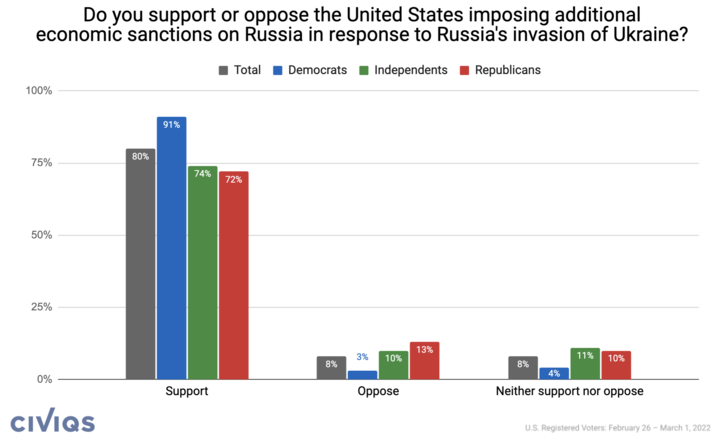Report: Voters Support Biden Strategy in Russia-Ukraine War
The February 2022 Daily Kos/Civiqs Poll asked 1,349 registered voters in the United States about the Russia-Ukraine War, the U.S. Supreme Court, schools’ response to the coronavirus pandemic, the January 6th, 2021 attack on the Capitol building, and more.
Russia-Ukraine War
On February 24, the Russian military invaded Ukraine. A large majority of Americans (69%) consider the war a threat to U.S. national security. Across party lines, 76% of Democrats, 66% of Republicans, and 63% of Independents believe that the invasion puts U.S. national security at risk. Among Republicans in particular, Civiqs tracking has shown a growing belief that Russia is more a foe of America than a potential ally.

In response to the invasion, President Biden imposed economic sanctions on Russia, but ruled out sending U.S. troops to fight in Ukraine. Americans support this strategy. Fully 80% of voters believe there should be additional economic sanctions against Russia, and only 28% favor U.S. military intervention.
A plurality (46%) of voters oppose the U.S. military becoming involved in the war, led by majorities of Republicans (56%) and Independents (50%). Democrats are split with 34% in support and 35% opposing U.S. military intervention in the Russia-Ukraine war.
The U.S. Supreme Court
This week, President Biden announced Ketanji Brown Jackson as his nominee to replace Justice Stephen Breyer on the Supreme Court. Americans support the nomination of Judge Jackson by a margin of 45% to 30%, with 25% indifferent or unsure. Democrats (87%) and Black voters (84%) are Judge Jackson’s strongest supporters. Most Republicans (59%) oppose the nomination. Independents are divided, with 33% supporting and 32% opposing the confirmation of Ketanji Brown Jackson to the Supreme Court.
The nomination comes at a time when opinions on the Supreme Court's ideological balance are deeply polarized. Most Democrats (76%) believe that the Supreme Court is too conservative. Republicans believe that the Supreme Court is either too liberal (41%) or has a good ideological balance (29%). Only 9% of voters believe the Supreme Court is not ideological.
Pubic Schools and the Pandemic
Public school systems are returning to in-person learning at the current stage of the coronavirus pandemic. Americans are largely (84%) in agreement with public schools remaining open for in-person learning. Republicans (96%) and Independents (85%) are most likely to support opening schools for in-person learning. Only 7% of Americans believe that public schools in their area should be remote right now.
A majority of voters (54%) oppose requiring teachers and students in public schools to wear face masks. Rural voters (65%) are most opposed to mask requirements. Among urban voters, 46% think that students and teachers should be required to wear masks, and 41% oppose a requirement.
When asked to think back to the start of the COVID-19 pandemic, only 37% of Americans say that their local public schools overreacted to the pandemic and should have kept more in-person learning. Another 37% of voters feel that their local public schools did a good job balancing in-person and remote learning -- and 13% believe schools were not cautious enough. A majority of Democrats (54%) think that their local public schools did a good job handling the balance between in-person and remote learning. Republicans (65%) and Independents (42%) are most likely to say that schools overreacted.
January 6, 2021 Attack on the U.S. Capitol
More than two in three Republicans (68%) support former President Donald Trump’s recent suggestion of a presidential pardon for people who participated in the attack on the U.S. Capitol building on January 6, 2021. Among all Americans, a majority (50%) strongly opposes presidential pardons for the Capitol building attackers. Democrats are nearly unanimous in opposition (95%) to presidential pardons.
Americans still overwhelmingly (77%) support arrests of people who broke into the U.S. Capitol building on January 6. Nearly half (47%) support arresting everyone who broke into the Capitol, and another 30% support arrests for those who caused injury or property damage
Republican support for arresting people who participated in the U.S. Capitol insurrection has fallen significantly over the past year. In January 2021, directly after the attack, 90% of Republicans supported arrests, with 35% wanting arrests of all of the attackers, and 55% saying to arrest those who caused damage. By July 2021, support for arrests among Republicans had fallen to 16% who wanted everyone to be arrested, and 39% who believed that only those who caused damage should be arrested.
A bare majority of Republicans (54%) currently support arrests related to the January 6th attack; either of everyone who broke in (9%), or those who were violent or damaged property (45%). Fully 41% of Republicans now say that none of the people who broke into the Capitol building should be arrested.
Civiqs surveyed 1,349 registered voters in the United States from February 26 – March 1, 2022. The survey was conducted online, among selected members of the Civiqs research panel. Sampled individuals were emailed by Civiqs and responded using a personalized link to the survey at civiqs.com. The survey results are weighted by age, race, gender, education, party identification, and region to be representative of the population of registered voters in the United States. The general design effect due to weighting is 1.03. The survey has a margin of error of ±2.7% at the 95% confidence level, accounting for the design effect.
Download the survey methodology and crosstabs
Interested in conducting a survey? Speak with a Civiqs Analyst.
Want Civiqs updates in your inbox? Sign up for our newsletter, Immediate Reaction.